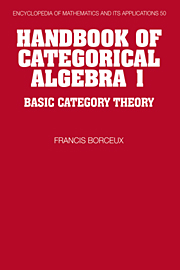Book contents
Preface to volume 1
Published online by Cambridge University Press: 30 December 2009
Summary
Volume 1 of the Handbook of category theory is concerned with those notions and techniques which turn out to appear quite naturally in most developments of category theory, independently of additional structures or properties one requires from the categories involved in the study.
Any book on category theory must say a word on the non-obvious problems concerned with the logical foundations of the theory. We mention both the axiom system of classes and that of universes, and later we freely use the presentation which fits best the problem we study. We chose not to dwell on foundational questions as long as the development of the theory does not really depend on them.
Another general principle in this volume is to develop the general notions from more accessible special cases, for which we have given a large supply of examples. This is by no means the most economical way of developing the theory, but we hope inexperienced readers will appreciate our pedagogical choice.
Of course we start with the basic vocabulary of categories, functors, natural transformations, monomorphisms, epimorphisms, isomorphisms. The analogies between monomorphisms and epimorphisms, covariant and contravariant functors, lead to the famous duality principle which is, with the Yoneda lemma, one of the key results of the first chapter.
- Type
- Chapter
- Information
- Handbook of Categorical Algebra , pp. x - xiiPublisher: Cambridge University PressPrint publication year: 1994

